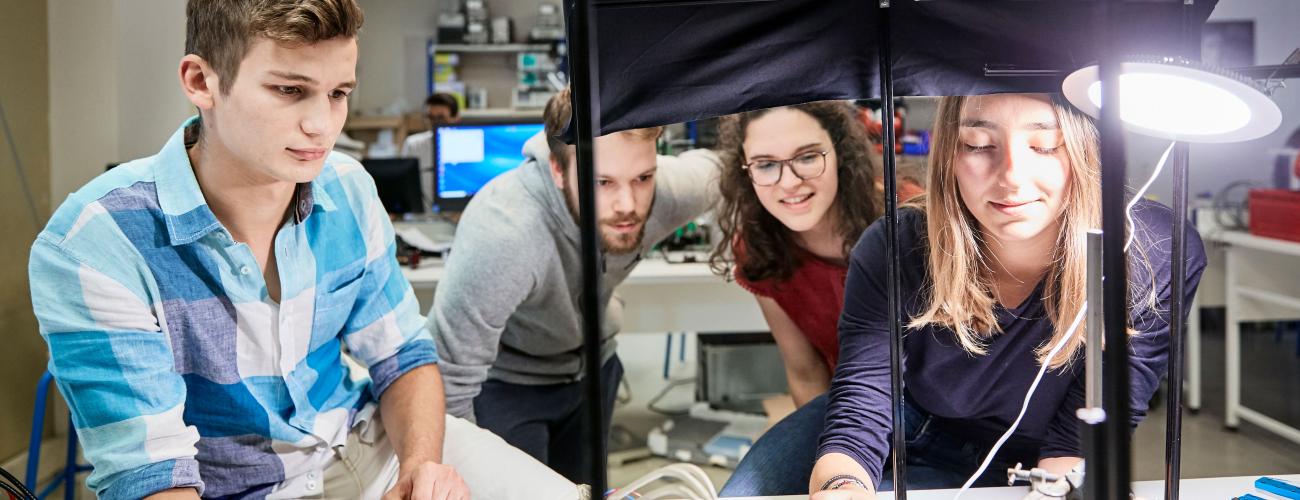
AgroParisTech - Grignon
©Jean-Hugues Berrou_AgroParisTech
Apprenticeship at the ParisTech Schools
The number of apprenticeship schemes run by France’s grandes écoles increases each year, reflecting the growing popularity of this training route among students. In the 2019/2020 academic year for example, 17% of engineering students in France were on work-study programmes.
When you consider the benefits that apprenticeships offer, it’s easy to see why demand is so high. They give students the opportunity to:
- Immerse themselves in the world of work from day one of their studies while still enjoying all the perks of student life
- Gain real-world practical experience to support the theoretical aspects of their course
- Develop soft skills and the qualities required of managers and leaders
- Fine-tune their career plans by gaining experience and trying out different roles within the world of engineering
- Boost their job prospects and build up a valuable portfolio of experience – a major plus in the eyes of potential employers
- Start establishing a robust and diverse professional network
- Receive full funding from a company to study at a prestigious school
- Earn a monthly salary and thus become more independent and self-reliant
Several of the ParisTech schools run programmes that allow students to complete all or part of their course on a work/study basis: AgroParisTech, Arts & Métiers, Chimie ParisTech - PSL and the Institut d’Optique Graduate School. Students who choose this route split their time between studying and working.
So how exactly does this work? Students who wish to embark on an apprenticeship must be hired by a company, which agrees to host them for a year (or more), starting in September. The scheme is flexible, and different ParisTech schools offer different options. Apprenticeships can be arranged for the entire course of study, or just for the 2nd and/or 3rd year for instance.
From a legal point of view, there are two types of work/study contract in France. The student’s individual situation and the options that their school offers will determine which contract is applicable:
- An apprenticeship contract, which is arranged via a dedicated training centre (Centre de Formation d’Apprentis, or CFA)
- A professionalisation contract
Students who sign an apprenticeship contract pursue their academic studies while also working at a private company or a public-sector institution. They take classes in general and technical subjects that complement the practical training they receive in the workplace. Young people on apprenticeship contracts have a dual status: they are both student and salaried employee.
The professionalisation contract offered by some higher education institutions is open to students in their final year of study.
In both cases, for the duration of the contract, the student follows a special training schedule devised by their school and the host company. The periods of work can vary from a few days to a few months at a time. The schedule is designed to allow the student to effectively balance work and study. Moreover, each student benefits from a dual support system. They are assigned a workplace mentor at their company, and an academic tutor within their school. The academic tutor is responsible for assessing and validating the student’s progress and learning.
To set up either type of apprenticeship, a contract must be signed by the host company, the student and the school. The contract specifies the duration of the programme and how the student will split their time between work and study. In particular, it gives details of the modules that the student will take, the number of hours of classes they are required to attend each semester, and the invoicing and financing arrangements**.
This type of work/study arrangement has several advantages. Firstly, it allows students to apply what they learn in the classroom almost immediately, which helps to consolidate their knowledge. Secondly, students are fully immersed in corporate culture – often at top management levels – before they even graduate. Furthermore, companies recognise that apprenticeship programmes equip students with strong scientific skills and a genuine ability to apply knowledge and implement projects. This means that apprentices can progress quickly and easily into leadership and management roles once they graduate.
Another key benefit is that the student’s training and tuition fees are fully covered by the host company for each year of the work/study programme. Under this system, students are also paid a percentage of the legal minimum wage (variable according to age and year of study).
Students who follow a work/study programme graduate with exactly the same qualification as those who opt for a purely academic route, making them highly employable individuals. They are often hired by the company where they did their apprenticeship, because they possess not only the broad skillset expected of a graduate from a top engineering school, but also the type of practical know-how that can only be acquired on the job.
Completing a work-study programme puts students at a significant advantage when it comes to future employment, as their skills and experience open up the doors to the institutions and sectors that recruit France’s best engineers and make them particularly valuable candidates.
Work/study programmes at AgroParisTech
Work/study programmes at Arts & Métiers
Work/study programmes at Chimie ParisTech – PSL (3rd year)
Work/study programmes at the Institut d’Optique Graduate School
*Flash Note No. 10 (June 2020) from the Departmental Statistics Service (SIES) for Higher Education, Research and Innovation, part of the French Ministry of Higher Education, Research and Innovation
**In some cases, state organisations known as OPCAs (Organismes Paritaires Collecteurs Agréés) are tasked with collecting funds and taxes and financing work-study programmes.
